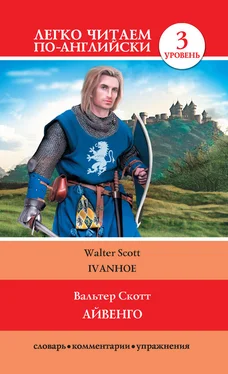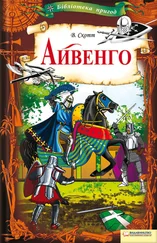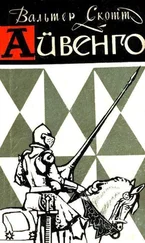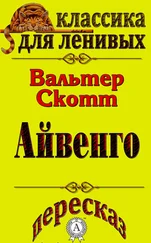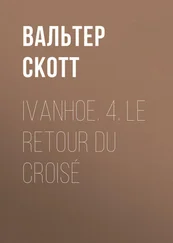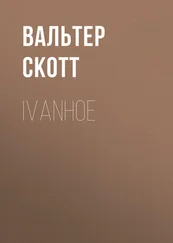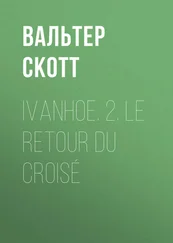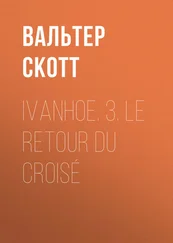“How did your master gain this gold?”
“By his good lance,” answered Gurth, “These bags contain the ransom of four good horses, and four good suits of armour.”
“How much is there?” demanded the robber.
“Two hundred coins.”
“Name those who paid the gold.”
Gurth did so.
“The armour and horse of the Templar Brian de Bois-Guilbert, at what ransom were they held? – You see you cannot deceive me.”
“My master,” replied Gurth, “will take nothing from the Templar except for his life.”
“And what were you doing at Ashby with such a sum of money?”
“I went there to return to Isaac the Jew of York,” replied Gurth, “the price of a suit of armour with which he fitted my master for this tournament.”
“And how much did you pay to Isaac?” – “I paid to Isaac,” said the Saxon, “eighty coins, and he restored me a hundred.”
“What?!” exclaimed all the robbers at once, “You are lying!”
“What I tell you,” said Gurth, “is as true as the moon is in heaven. You will find the money in a silken purse separate from the rest of the gold.”
The Captain said, “You are talking about a Jew—as unable to return gold, as the dry sand of the desert is to return water.”
“It is, however, as I say,” said Gurth.
“Strike a light,” said the Captain, “I will examine this miracle.”
Somebody made a light, and the robber examined the purse. The others crowded around him, and even the two who were holding Gurth relaxed while they stretched their necks to see. By a sudden effort Gurth shook himself free of their hold, and might have escaped, but he didn’t want to leave his master’s property. He took a staff, struck down the Captain and almost succeeded in taking back the money. The thieves, however, were too strong for him, and again secured both the bag and himself.
“Knave!” said the Captain, getting up, “you have broken my head, and other men of our sort would have killed you. I’ll tell you what I’m going to do, only stand still. – Friends!” he then said, addressing his band, “this purse has words in Hebrew on it, and I well believe the yeoman’s story is true. We will not take his master’s money. He is too like ourselves for us to rob him.”
“Like us?” answered one of the band, “I would like to hear why.”
“You fool,” answered the Captain, “is he not poor and disinherited as we are? – Doesn’t he win his food with his sword as we do? – Has he not beaten Front-de-Boeuf and Malvoisin, as we would beat them if we could?”
The man replied: “And this man, – he too will leave unharmed?”
“Not if you can harm him,” replied the Captain. “Here, fellow,” he said to Gurth, “can you use the staff?”
“I think,” said Gurth, “you can answer that question.”
“True,” replied the Captain, “do the same for this fellow, and you will pass freely. – Take your staff, Miller,” he added, “and keep your head, and give the fellow a staff—there is enough light to fight.”
The two champions stepped forward into the centre of the open space. For a long time they fought equally, until the Miller began to lose temper because his opponent was strong and his companions started to laugh at him. This gave Gurth the opportunity to win which he used immediately.
The Miller pressed furiously forward, using both ends of his weapon, while Gurth defended himself against the attack, covering himself by shifting his weapon with great speed. When the Miller was out of breath, Gurth pretended to attack him with one side of his staff and suddenly struck him on the left side of the head with the other end of the weapon. The Miller fell to the ground.
“Well done!” shouted the robbers, “Old England forever! The Saxon has saved both his purse and his head, and the Miller has met his match. [21]”
“You can go, my friend,” said the Captain, “and I will give you two men to guide you to your master’s tent. Only remember that you have refused to tell his name—don’t ask about ours, and don’t try to discover who we are.”
Gurth thanked the Captain, and promised to follow his recommendation. Two of the bandits took him to the open place from which he could see the lists and the tents. Here the thieves stopped.
“Good night to you, kind sirs,” said Gurth and he went to the tent of his master, where he told the knight about his adventures.
The Disinherited Knight was filled with astonishment, no less at the generosity of Rebecca, than that of the robbers.
* * *
Next morning was dedicated to the general tournament. The Disinherited Knight was the leader of one group of knights and Brian de Bois-Guilbert was the first champion of the other band. Many knights who were not prepared to challenge a single opponent of high reputation wanted to show themselves in the general combat. On the present occasion, there were about fifty knights on each side.
Simple people and nobles all came to watch the fight, including Cedric the Saxon with the Lady Rowena. Athelstane, however, put on his armour and, to Cedric’s surprise, joined the part of the Templar. His only reason for doing so was to punish the champion of the preceding day for choosing Rowena (whom Athelstane considered to be his bride) as the Queen of Love and Beauty.
As soon as Prince John saw that the Queen of the day had arrived upon the field, he rode forward to meet her, dismounted and helped the Lady Rowena to get down from her horse.
“This is,” said Prince John, “how we set the example of loyalty to the Queen of Love and Beauty.” Then the Prince led Rowena to the seat of honour opposite his own.
The knights, entering at either end of the lists in long procession, arranged themselves in two lines on each side. The leader of each party took the place in the centre of the first line.
The trumpets sounded, the knights lowered their spears, and the first line of each party rushed forward. They met in the middle of the lists with a terrible noise. The second line of each party advanced more slowly to replace the defeated.
The results of the clash were not immediately seen, because of the dust raised by so many horses. When the fight became visible, half the knights on each side were dismounted. Some had already jumped to their feet and were attacking those of their antagonists who were in the same situation. The mounted knights, whose lances had been almost all broken, were now closely engaged with their swords, shouting their war-cries.
The leaders of each party tried to find each other on the field, but again and again had to fight some brave knight from the opposite band. When many knights were defeated, the Templar and the Disinherited Knight met hand to hand. Their strokes were so furious, that the spectators all began to shout in admiration.
But at this moment the party of the Disinherited Knight was in a dangerous situation. The gigantic arm of Front-de-Boeuf on the one side, and the enormous strength of Athelstane on the other defeated many brave opponents. When they were free from antagonists, they decided to help the Templar. Turning their horses at the same moment, the Norman rushed against the Disinherited Knight on the one side, and the Saxon on the other.
“Beware! Sir Disinherited!” was shouted so universally, that the knight became aware of his danger. He made his horse step back so that Athelstane and Front-de-Boeuf rushed between him and the Templar unable to stop. However, some minutes later they joined their leader in his attack.
Nothing could have saved their antagonist, except for the remarkable strength and activity of the noble horse which he had won on the preceding day. The horse of Bois-Guilbert was wounded, and those of Front-de-Boeuf and Athelstane were both tired with the weight of their gigantic masters in complete armour. The skill of the Disinherited Knight and the activity of his noble animal enabled him for a few minutes to keep at sword’s point his three antagonists, although it was clear that he must soon be defeated.
Читать дальше
Конец ознакомительного отрывка
Купить книгу
